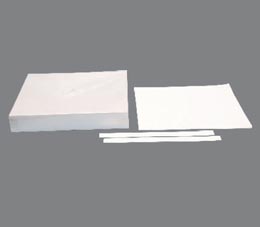The absorbent pad, also called a wick or wicking pad, pulls fluid off of the membrane to allow the capillary flow
of the membrane to keep flowing in the proper direction and at the proper rate. If an absorbent pad isn't used
(or if it separates from the membrane so it is functionally absent), the sample and buffer will back flow down
the membrane and could raise the background or possibly cause false positives. This can also occur if the
absorbent pad selected for the volumes of buffer and sample involved is inadequate.
Most absorbent pads are made from non-woven, cellulose fibre sheets. These pads can be manufactured in a
variety of thicknesses and densities to suit the needs of the assay.
| Ordering information |
| Cat. No. |
Size |
Composition |
Applications |
| 1222 |
As desired |
100% cotton fibres |
Sink Pad/Absorbent pad |
| Technical information |
| Cat. No. |
Basic weight g/m2 |
Caliper mm |
Wicking rate s/4 cm |
Water absorption Mg/cm2 |
| 1222 |
291 |
0.83 |
20 |
88 |

